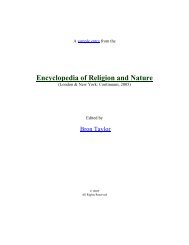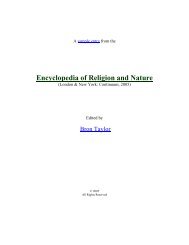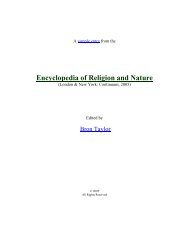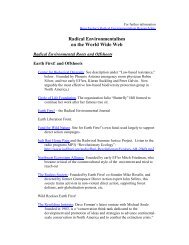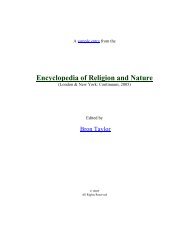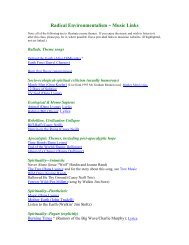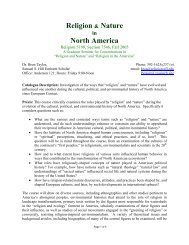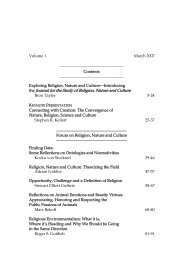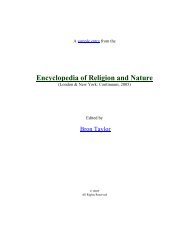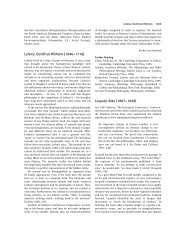Rock Climbing - Religion and Nature
Rock Climbing - Religion and Nature
Rock Climbing - Religion and Nature
You also want an ePaper? Increase the reach of your titles
YUMPU automatically turns print PDFs into web optimized ePapers that Google loves.
1400 Rolston III, Holmes<br />
of climbing nature often becomes a means to our ends –<br />
even while we purport to be worshipping it.<br />
Yet, if we grant certain ego needs <strong>and</strong> failures to our<br />
kind, perhaps we can view climbing – <strong>and</strong> things like it –<br />
as simultaneously muddled <strong>and</strong> miraculous. On the latter<br />
side, climbing, for all of my skepticism, still affords the<br />
chance to gain a celestial view from a terrestrial perch.<br />
Doing so, climbing allows for an oceanic experience that<br />
inspires a caring rather than a conquering attitude toward<br />
the rock. And it must be said that within the climbing<br />
community there has always been a vocal environmentalist<br />
element. These climbers – from the very beginning of<br />
the sport – have maintained a “clean” ethic, seeking to<br />
leave no trace on the rocks they ascend. Moreover, their<br />
sensibilities extend to the broader context of public l<strong>and</strong><br />
use. Such climbers <strong>and</strong> the action groups they form <strong>and</strong><br />
support have been instrumental in advancing low-impact<br />
approaches to nature.<br />
Greg Johnson<br />
See also: Deep Ecology; Mountaineering; Naess, Arne;<br />
Surfing.<br />
Rolston III, Holmes (1932–)<br />
Leading environmental philosopher, ethicist, <strong>and</strong> theologian,<br />
Holmes Rolston III is widely recognized as the<br />
“father of environmental ethics” for his central role in<br />
developing environmental ethics as a modern academic<br />
discipline. Throughout his distinguished career, he has<br />
helped make explicit the ethics of nature that have been<br />
implicit in philosophical <strong>and</strong> sacred writings since ancient<br />
times. Born in the Shen<strong>and</strong>oah Valley of Virginia on 19<br />
November 1932, Rolston’s multidisciplinary educational<br />
career included a childhood spent in contact with nature,<br />
an undergraduate degree in physics (Davidson College,<br />
1953), a divinity degree (Union Theological Seminary,<br />
1956), a Ph.D. in theology (University of Edinburgh,<br />
1958), <strong>and</strong> later a masters in philosophy of science (University<br />
of Pittsburgh, 1968). He wrote the acclaimed books<br />
Philosophy Gone Wild (1986), Environmental Ethics<br />
(1988), Science <strong>and</strong> <strong>Religion</strong>: A Critical Survey (1987),<br />
Conserving Natural Value (1994), <strong>and</strong> Genes, Genesis <strong>and</strong><br />
God: Values <strong>and</strong> their Origins in Natural <strong>and</strong> Human History<br />
(Gifford Lectures, University of Edinburgh, 1997–<br />
1998) (1999). He edited Biology, Ethics, <strong>and</strong> the Origins of<br />
Life (1994), <strong>and</strong> in 1979, helped found the now-refereed<br />
professional journal Environmental Ethics. Additional<br />
works include 80 chapters in other books <strong>and</strong> over 100<br />
articles, a number of which have been used in college<br />
courses <strong>and</strong> have been translated into at least a dozen<br />
languages. A founding member of the International Society<br />
for Environmental Ethics (1990) <strong>and</strong> delegate to the<br />
United Nations Conference on Environment <strong>and</strong> Development<br />
(Rio de Janeiro, Brazil, 1992), Rolston has lectured<br />
on all seven continents, consulted with dozens of conservation<br />
groups, received numerous awards including the<br />
2003 Templeton Prize for Progress Toward Research or<br />
Discoveries about Spiritual Realities, <strong>and</strong> currently serves<br />
as University Distinguished Professor of Philosophy at<br />
Colorado State University, his professorial post since<br />
1976.<br />
For four centuries following the Enlightenment <strong>and</strong><br />
the scientific revolution in Europe, Western philosophy<br />
promoted an almost exclusively anthropocentric focus,<br />
perceiving nature as mechanistic <strong>and</strong> only having value<br />
in relation to human uses <strong>and</strong> preferences. In the early<br />
1970s, Rolston acknowledged that nature had instrumental<br />
or use-values for medicine, agriculture, <strong>and</strong><br />
industry. He went further, though, recognizing that<br />
nature had other values – aesthetic, ecological, educational,<br />
historical, recreational, scientific, economic, <strong>and</strong><br />
religious – as well as intrinsic value. Fundamentally, he<br />
argued, organisms (including plants, animals, <strong>and</strong><br />
humans), species, ecosystems, <strong>and</strong> the Earth have<br />
intrinsic value just for the fact that they have evolved<br />
<strong>and</strong> survived for millions <strong>and</strong> billions of years. Each level<br />
also has systemic value (value associated with processes<br />
<strong>and</strong> capacity to produce) that is interwoven with instrumental<br />
<strong>and</strong> intrinsic values. Rolston posits that for all of<br />
these reasons <strong>and</strong> more, humans have ethical obligations<br />
to the environment.<br />
An ordained Presbyterian pastor like his father <strong>and</strong><br />
gr<strong>and</strong>father, Rolston frequently draws on the Bible,<br />
emphasizing in writing <strong>and</strong> in lectures its implied guidance<br />
on environmental ethics. He likes to think of the<br />
“swarms of living creatures” brought forth from l<strong>and</strong> <strong>and</strong><br />
sea (Gen. 1:20, 24) as early references to biodiversity <strong>and</strong><br />
notes that when God reviewed the display of life he found<br />
it “very good.” According to Rolston, the story of Noah’s<br />
ark illustrates that God wills for species to continue (Gen.<br />
6:19) <strong>and</strong> the rainbow is God’s sign re-establishing “the<br />
covenant . . . between me <strong>and</strong> you <strong>and</strong> every living creature<br />
that is with you, for all future generations” (Gen.<br />
9:12–13). In addition to the ecological, intrinsic, aesthetic,<br />
instrumental, <strong>and</strong> religious values implied in Genesis <strong>and</strong><br />
Matthew 6, Rolston highlights biblical passages that speak<br />
to economic <strong>and</strong> other values, as well as human<br />
responsibilities.<br />
Rolston promotes the idea that ethics are for people, but<br />
not only about people. To whom much is given, much is<br />
required, <strong>and</strong> humans have a rich <strong>and</strong> ancient inheritance,<br />
the Earth <strong>and</strong> biosphere, to steward. Rolston says that perhaps<br />
we make our deepest error “forever putting ourselves<br />
first, never putting ourselves in place in the fundamental<br />
biosphere community in which we reside” (2000: 83).<br />
Through his writings <strong>and</strong> lectures, he attempts to instill<br />
a more profound sense of civic <strong>and</strong> environmental



